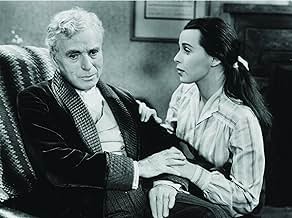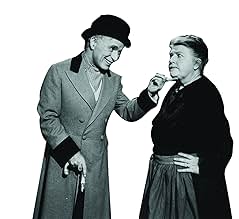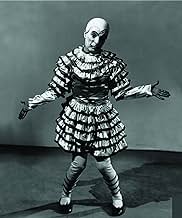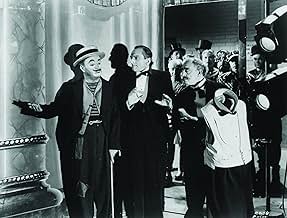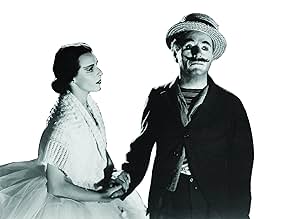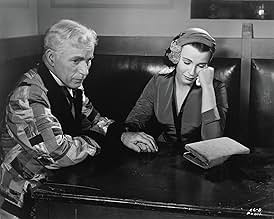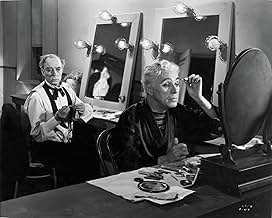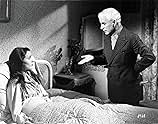IMDb-BEWERTUNG
8,0/10
23.399
IHRE BEWERTUNG
Ein alternder Komiker und eine suizidale Balletttänzerin kümmern sich umeinander und finden so wieder Hoffnung und einen Sinn in ihrem Leben.Ein alternder Komiker und eine suizidale Balletttänzerin kümmern sich umeinander und finden so wieder Hoffnung und einen Sinn in ihrem Leben.Ein alternder Komiker und eine suizidale Balletttänzerin kümmern sich umeinander und finden so wieder Hoffnung und einen Sinn in ihrem Leben.
- 1 Oscar gewonnen
- 7 Gewinne & 4 Nominierungen insgesamt
Molly Glessing
- Maid
- (as Mollie Glessing)
Leonard Mudie
- Dr. Blake - Calvero's Doctor
- (as Leonard Mudi)
'Snub' Pollard
- Street Musician
- (as Snub Pollard)
Billy Lee Aimone
- Little Boy
- (Nicht genannt)
Empfohlene Bewertungen
Charles Chaplin plays Calvero, an aging clown who rescues a ballet dancer called Terry (Claire Bloom) from committing suicide.These two become friends and Calvero gets more meaning to his life.He desperately tries to make a come back to become the greatest clown again but it's hard to make people laugh anymore.Limelight from 1952 was Charles Chaplin's last American film.It was a flop but the film won an Academy Award for best score in 1972.That year the king of comedy got also a special Oscar for career achievement.This was Chaplin's most sentimental movie and it also was very touching.Chaplin is amazing as the aging clown.The man wasn't only a great comedian.He was also a terrific actor.It's hard to top his performance in this movie.Claire Bloom's performance as the ballet dancer is also brilliant.Chaplin's son Sydney plays Neville in the movie.There are also Chaplin's children Victoria, Michael, Josephine, Geraldine and Charles Chaplin Jr. in this film.This is truly a masterpiece.This proves that Chaplin didn't shine only in silent movies.He did that also in talkies.And this is one of his best talkies. The dialogue is just delicious in this comedic drama.In the end you can see another great comedian from the silent era;Buster Keaton.You can see Chaplin and Keaton clowning together in the end.And that is one great scene.A scene to remember.The message of Limelight is how wonderful life is.Enjoy it while you still can.
A washed-up, formerly-famous Music Hall comic, Charlie Chaplin, saves a suicidal ballerina, Claire Bloom. In the process of giving her the hope to move on and succeed, he regains the confidence to return to the stage himself.
"Limelight" is a moving and autobiographical film that works as both a bittersweet drama and a mirror into the soul of one of the world's greatest film makers. I sometimes wondered if my affection for this film is based on my knowledge of Chaplin's life and career, and the parallels between "Limelight" and people and incidents in his own life. When I watch this film I see an artist standing naked at a crossroads before his audience, unsure where to go and what to do. However, I know the film does not require an advanced degree in Chaplin to enjoy. My wife, who could probably do little more than identify the Tramp in a lineup before marrying me, loved this film before she met me. I have also had the good fortune to see the film in a theater in New York and watch it work its wonders on an audience. Stylistically, it might be dated, but the magic lingers.
"Limelight" is best viewed as a drama with comedy rather than a comedy with drama. Outwardly, it is the simple story of a vulnerable youth who mistakes her gratitude for love, and an older man wise enough to know the difference. But it's more than that too. It's about an artist's nature, and the addictive power of applause. The Chaplin character, Calvero, knows how to make people laugh, but feels he has lost the ability to do so. He realizes he is at the end of his career, but he still hungers for one final moment in the limelight. The film is talky and philosophical, and, yes, a little pompous and pretentious at times too. It's almost as if Chaplin is trying to impart through words the simple joys and mystery of life he was once able to express effortlessly through simple slapstick alone. Does this flood of words mean Chaplin has lost his skills as a film maker? No. He still has the power to move.
"Limelight" is Chaplin's final masterpiece. It is one of my favorites. I prefer to think of it as his last film. Should this be your first Chaplin film? No. Start with films like "The Gold Rush," "City Lights," and "The Great Dictator." Come to know the comedian before you get to know the man.
"Limelight" is a moving and autobiographical film that works as both a bittersweet drama and a mirror into the soul of one of the world's greatest film makers. I sometimes wondered if my affection for this film is based on my knowledge of Chaplin's life and career, and the parallels between "Limelight" and people and incidents in his own life. When I watch this film I see an artist standing naked at a crossroads before his audience, unsure where to go and what to do. However, I know the film does not require an advanced degree in Chaplin to enjoy. My wife, who could probably do little more than identify the Tramp in a lineup before marrying me, loved this film before she met me. I have also had the good fortune to see the film in a theater in New York and watch it work its wonders on an audience. Stylistically, it might be dated, but the magic lingers.
"Limelight" is best viewed as a drama with comedy rather than a comedy with drama. Outwardly, it is the simple story of a vulnerable youth who mistakes her gratitude for love, and an older man wise enough to know the difference. But it's more than that too. It's about an artist's nature, and the addictive power of applause. The Chaplin character, Calvero, knows how to make people laugh, but feels he has lost the ability to do so. He realizes he is at the end of his career, but he still hungers for one final moment in the limelight. The film is talky and philosophical, and, yes, a little pompous and pretentious at times too. It's almost as if Chaplin is trying to impart through words the simple joys and mystery of life he was once able to express effortlessly through simple slapstick alone. Does this flood of words mean Chaplin has lost his skills as a film maker? No. He still has the power to move.
"Limelight" is Chaplin's final masterpiece. It is one of my favorites. I prefer to think of it as his last film. Should this be your first Chaplin film? No. Start with films like "The Gold Rush," "City Lights," and "The Great Dictator." Come to know the comedian before you get to know the man.
Charlie Chaplin is one of the undisputed masters of the cinema. He was one of the funniest actors of the cinema, and he was also one of the greatest directors. Of course, the films that he is most famous for are his silent comedies, especially The Gold Rush, City Lights, and Modern Times. The latter two were the product of Chaplin's stubborn clinging to the format and conventions of the silent cinema, though everyone else had gone to sound. This stubbornness was certainly sound. His contemporaries such as Buster Keaton and Harold Lloyd lost popularity when they moved to sound. Chaplin's last two silent films were popular and made a lot of money. Audiences may have craved sound, but they craved Chaplin, too, and did not disdain his silence. He was one of the silent artists who thought that they were just achieving the peak of their medium when sound came in. He proved himself right, since City Lights (1931) and Modern Times (1936) are probably his two best films, and both are two of the best films ever made.
Finally, in 1940, Chaplin directed and starred in his first talkie, The Great Dictator. Three more followed, Monsieur Verdoux, then Limelight, then King of New York, which happens to be the only one of these four I have not seen. The Great Dictator and Monsieur Verdoux were both good films in their own way, but perhaps Chaplin's in depth political commentary in these films detracted from them. The type of comedy that you find in his silent films did not mix well with this social commentary. The simple juxtapositions of the worlds of the poor and the rich in City Lights and Modern Times were far more powerful than what his first two talkies had to offer.
Then came Limelight, one of the most bittersweet films ever made. It is not perfect, but it achieves a grand melodramatic beauty that few films have ever even approached. The story is simple: a washed-up, old vaudvillian rescues a young ballet dancer from suicide. He takes care of her until she is healthy again, and even restores her confidence. The story may be simple, but the character dynamics are very complex. As the dancer, Theresa, is recovering, Calvero is not only rebuilding her confidence, but also his own. Theresa, because of his kindness towards her, finally believes she has fallen in love with him, even going so far as proposing marriage to him. Whether she actually loves him or not, and Calvero strongly asserts that she shouldn't and doesn't, these two characters have a constantly evolving relationship that does not end until the credits role. It is utterly fascinating, captivating, and dramatic.
There are a couple of problems, and though they're small, they deserve attention. Perhaps the biggest problem is that Claire Bloom is quite guilty of overacting. Her line delivery is bizarre and overdramatic. This isn't a big deal, since you ought to be keenly aware that the film takes place in the world of melodrama, and is thus exaggerated. Another thing that irked me is Buster Keaton's role. It is little more than a cameo. In fact, his character doesn't even have a name in the credits. This is truly disappointing, seeing that he, although Chaplin may have had the most heart, was the all-around funniest silent comedian.
Finally, in 1940, Chaplin directed and starred in his first talkie, The Great Dictator. Three more followed, Monsieur Verdoux, then Limelight, then King of New York, which happens to be the only one of these four I have not seen. The Great Dictator and Monsieur Verdoux were both good films in their own way, but perhaps Chaplin's in depth political commentary in these films detracted from them. The type of comedy that you find in his silent films did not mix well with this social commentary. The simple juxtapositions of the worlds of the poor and the rich in City Lights and Modern Times were far more powerful than what his first two talkies had to offer.
Then came Limelight, one of the most bittersweet films ever made. It is not perfect, but it achieves a grand melodramatic beauty that few films have ever even approached. The story is simple: a washed-up, old vaudvillian rescues a young ballet dancer from suicide. He takes care of her until she is healthy again, and even restores her confidence. The story may be simple, but the character dynamics are very complex. As the dancer, Theresa, is recovering, Calvero is not only rebuilding her confidence, but also his own. Theresa, because of his kindness towards her, finally believes she has fallen in love with him, even going so far as proposing marriage to him. Whether she actually loves him or not, and Calvero strongly asserts that she shouldn't and doesn't, these two characters have a constantly evolving relationship that does not end until the credits role. It is utterly fascinating, captivating, and dramatic.
There are a couple of problems, and though they're small, they deserve attention. Perhaps the biggest problem is that Claire Bloom is quite guilty of overacting. Her line delivery is bizarre and overdramatic. This isn't a big deal, since you ought to be keenly aware that the film takes place in the world of melodrama, and is thus exaggerated. Another thing that irked me is Buster Keaton's role. It is little more than a cameo. In fact, his character doesn't even have a name in the credits. This is truly disappointing, seeing that he, although Chaplin may have had the most heart, was the all-around funniest silent comedian.
Most ordinary people fall into a role and a persona in their lives, and tend to not veer very far from it if it provides for them. Perhaps, due to extreme situations, they may find it necessary to reinvent themselves once or twice and rise to the occasion or fall into dissolution.
An artist like Chaplain had to reinvent himself over and over again over four decades, particularly in a medium that was changing every few years. That's probably why he had so many failed marriages with younger woman; he had to feel like a "player" to keep the flow going and fight back the doubt and anxiety (and the terror of becoming irrelevant) that inevitably begins to haunt creative men in their twilight years. Don't underestimate the power of sex magic!
Limelight is a film about those demons, and the immense courage (and yes, the love of a much younger woman, too, doesn't hurt), that is required to triumph over them. Still, everyone knows there is one specter that no man can outrun -- Death. Chaplain masks this existential dimension in layers of sentimental melodrama which you will have to decide for yourself is effective, but I think he does this intentionally to smuggle in some deep and darker themes that filmmakers like Bergman would become famous for continually exploring masterfully.
I found myself going back and forth with Limelight; there are times when the melodrama overpowers the film, and the pedestrian cinematography doesn't help matters. A few times I felt like I was watching the old Abbot and Costello TV show, particularly the apartment scenes. However, Chaplain is such an immense presence you can't help be engaged and encouraged to keep watching because you want so much for his character Calvero to triumph. His co-star, Claire Bloom, is quite effective, too, and she has several "looks" in this film to contrast and mirror the ongoing struggle the old comedian in having internally.
Getting on in years myself, and feeling washed up and without hope and purpose, Calvero's plight and faltering desire to once again command the Limelight was quite cathartic. I was amazed by his final performance with Keaton; when Calvero starts rocking that violin like Eddie Van Halen in his prime, I was in a state of sublime fascination. Here was a true artist giving everything up for his audience, feeling the peak thrill of having the audience at his command once again for a few fleeting moments; a thrill that, tragically, he will pay dearly for.
We can only hope that we, too, can earn such an exalted death as Calvero's. Perhaps that is Chaplain's hidden message in this film; that life is, in the final analysis, about striving for a death that ennobles those you leave behind.
An artist like Chaplain had to reinvent himself over and over again over four decades, particularly in a medium that was changing every few years. That's probably why he had so many failed marriages with younger woman; he had to feel like a "player" to keep the flow going and fight back the doubt and anxiety (and the terror of becoming irrelevant) that inevitably begins to haunt creative men in their twilight years. Don't underestimate the power of sex magic!
Limelight is a film about those demons, and the immense courage (and yes, the love of a much younger woman, too, doesn't hurt), that is required to triumph over them. Still, everyone knows there is one specter that no man can outrun -- Death. Chaplain masks this existential dimension in layers of sentimental melodrama which you will have to decide for yourself is effective, but I think he does this intentionally to smuggle in some deep and darker themes that filmmakers like Bergman would become famous for continually exploring masterfully.
I found myself going back and forth with Limelight; there are times when the melodrama overpowers the film, and the pedestrian cinematography doesn't help matters. A few times I felt like I was watching the old Abbot and Costello TV show, particularly the apartment scenes. However, Chaplain is such an immense presence you can't help be engaged and encouraged to keep watching because you want so much for his character Calvero to triumph. His co-star, Claire Bloom, is quite effective, too, and she has several "looks" in this film to contrast and mirror the ongoing struggle the old comedian in having internally.
Getting on in years myself, and feeling washed up and without hope and purpose, Calvero's plight and faltering desire to once again command the Limelight was quite cathartic. I was amazed by his final performance with Keaton; when Calvero starts rocking that violin like Eddie Van Halen in his prime, I was in a state of sublime fascination. Here was a true artist giving everything up for his audience, feeling the peak thrill of having the audience at his command once again for a few fleeting moments; a thrill that, tragically, he will pay dearly for.
We can only hope that we, too, can earn such an exalted death as Calvero's. Perhaps that is Chaplain's hidden message in this film; that life is, in the final analysis, about striving for a death that ennobles those you leave behind.
Permeated with profound melancholy, told with a wistful eye and heavily autobiographical in its depiction of events, Limelight concerns a fading comedian who's forced to deal with the loss of his popularity but finds purpose & hope by helping out a suicidal dancer. Anchored by excellent performances, the film is a powerfully moving & deeply personal effort from the great visionary.
Written, produced, directed & also composed by Charlie Chaplin (A Woman of Paris & Monsieur Verdoux), the story borrows ideas & events from the acclaimed filmmaker's own past & present life and finely balances hope with despair, stardom with obscurity, happiness with heartbreak & laughter with tears. It captures the power of kindness, the beauty of companionship & is an ode to life itself.
Chaplin also stars as the washed-out music hall comedian whose lost fame alludes to his own decreased popularity in the United States and the gaze, gestures & expressions with which he articulates his poignance & longing has a pitch-perfect conviction to it. Claire Boom is brilliant as well and her performance only gets stronger as plot progresses. And the two share a warm, wonderful chemistry together.
Overall, Limelight presents Charlie Chaplin making peace with his glorious past, acknowledging & accepting the realities of his place in the present world, and looking forward to his future with renewed hope. There are plenty of impressive scenes in this film but the most memorable one is where cinema's two greatest comedians unite for a gag together: a final coda on the stage that once was the playground of these screen legends.
Written, produced, directed & also composed by Charlie Chaplin (A Woman of Paris & Monsieur Verdoux), the story borrows ideas & events from the acclaimed filmmaker's own past & present life and finely balances hope with despair, stardom with obscurity, happiness with heartbreak & laughter with tears. It captures the power of kindness, the beauty of companionship & is an ode to life itself.
Chaplin also stars as the washed-out music hall comedian whose lost fame alludes to his own decreased popularity in the United States and the gaze, gestures & expressions with which he articulates his poignance & longing has a pitch-perfect conviction to it. Claire Boom is brilliant as well and her performance only gets stronger as plot progresses. And the two share a warm, wonderful chemistry together.
Overall, Limelight presents Charlie Chaplin making peace with his glorious past, acknowledging & accepting the realities of his place in the present world, and looking forward to his future with renewed hope. There are plenty of impressive scenes in this film but the most memorable one is where cinema's two greatest comedians unite for a gag together: a final coda on the stage that once was the playground of these screen legends.
Wusstest du schon
- WissenswertesThe Academy Award that Sir Charles Chaplin won for composing this film's score is the only competitive Oscar he ever received; his other awards were given to him for special achievement outside of the established categories.
- PatzerIn discussing the ballet with the cast, the dance director Bodalink casts a giant shadow in front of the auditorium seats (revealing it to be nothing more than a backdrop).
- Crazy Credits"The glamour of limelight, from which age must pass as youth enters."
- Alternative VersionenThe version of the film that premiered in London in 1952 ran 141 minutes. It had been in distribution for several months, when Charles Chaplin recalled film prints and deleted a scene in which Calvero leaves the sleeping Thereza, and goes to a bar, where he meets his old friend Claudius, the arm-less violin player, who gives Calvero money. The film ran 137 minutes after this scene was edited out for worldwide distribution. In the ending credits, there is still a billing for Stapleton Kent as Claudius, even though he is no longer seen in the film. The DVD includes the deleted scene as an extra feature.
- VerbindungenEdited into Geschichte(n) des Kinos: Une histoire seule (1989)
Top-Auswahl
Melde dich zum Bewerten an und greife auf die Watchlist für personalisierte Empfehlungen zu.
- How long is Limelight?Powered by Alexa
Details
- Erscheinungsdatum
- Herkunftsland
- Offizielle Standorte
- Sprache
- Auch bekannt als
- Candilejas
- Drehorte
- Produktionsfirma
- Weitere beteiligte Unternehmen bei IMDbPro anzeigen
Box Office
- Weltweiter Bruttoertrag
- 9.291 $
- Laufzeit
- 2 Std. 17 Min.(137 min)
- Farbe
- Seitenverhältnis
- 1.37 : 1
Zu dieser Seite beitragen
Bearbeitung vorschlagen oder fehlenden Inhalt hinzufügen


